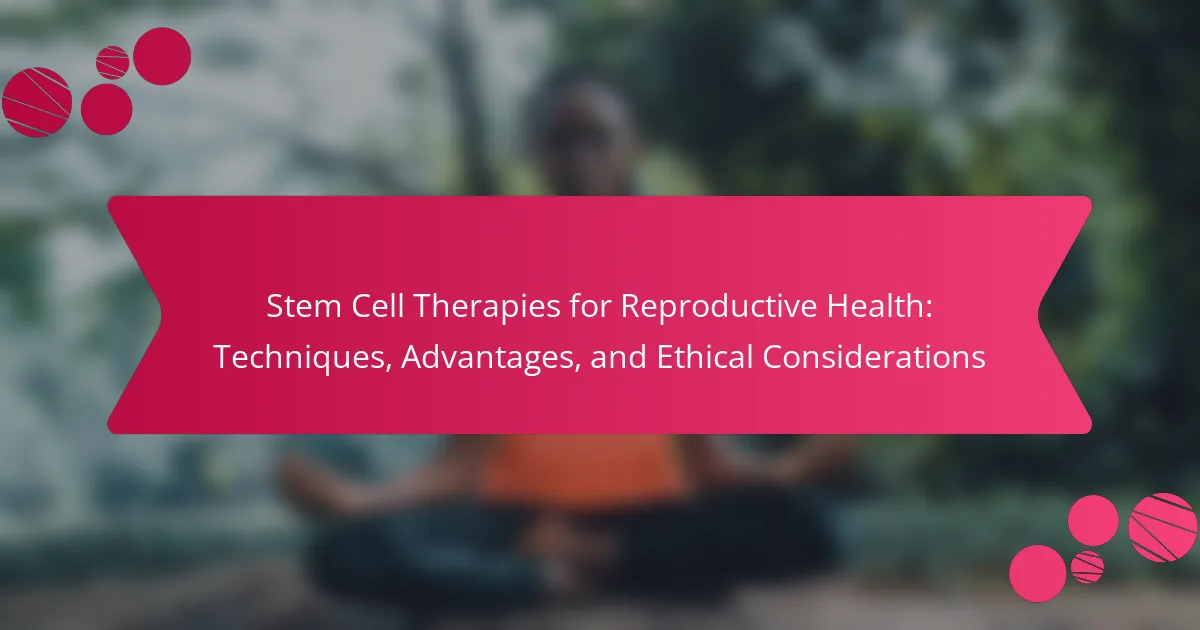Stem cell therapies for reproductive health offer promising solutions for restoring fertility and treating reproductive disorders. This article explores techniques like autologous stem cell transplantation, in vitro differentiation, and gene editing. It highlights the advantages of personalised treatment and regenerative healing while addressing vital ethical considerations surrounding informed consent and the implications of genetic modifications. Understanding these aspects is crucial for navigating the evolving landscape of reproductive health solutions.
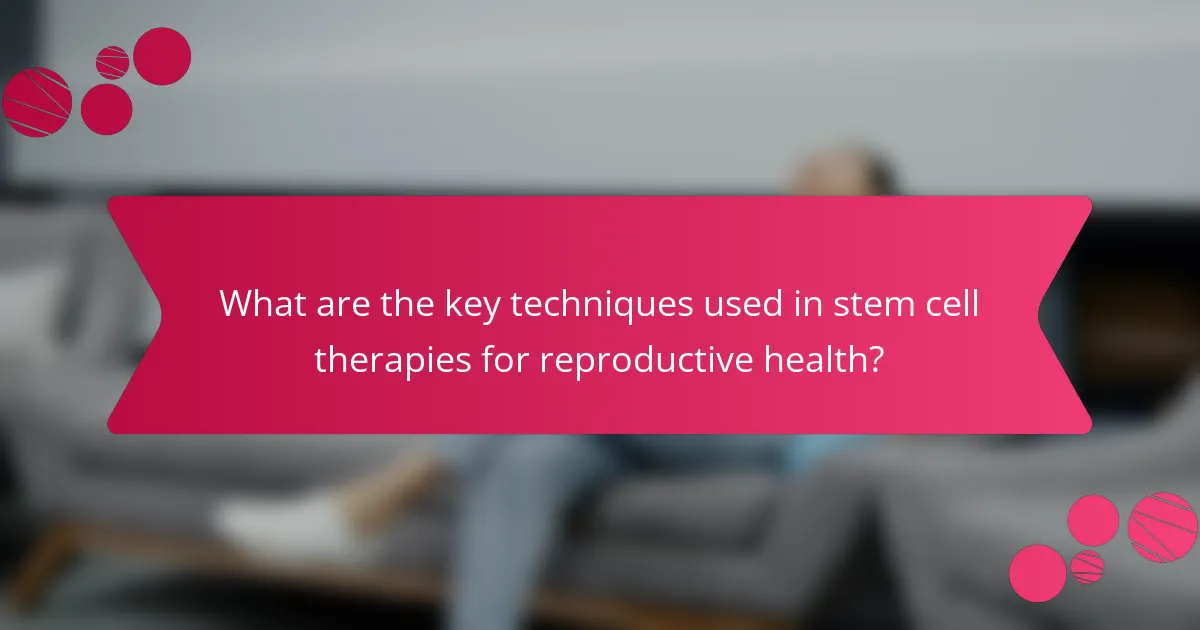
What are the key techniques used in stem cell therapies for reproductive health?
Stem cell therapies for reproductive health employ techniques like autologous stem cell transplantation, in vitro differentiation, and gene editing. These methods aim to restore fertility and treat reproductive disorders.
Autologous stem cell transplantation uses the patient’s own stem cells, minimising rejection risks. In vitro differentiation allows stem cells to develop into specific reproductive cell types, enhancing treatment effectiveness. Gene editing techniques, such as CRISPR, can correct genetic defects that affect reproductive health.
These techniques provide significant advantages, including personalised treatment options and the potential for regenerative healing. Ethical considerations remain vital, emphasising informed consent and the implications of genetic modifications.
How do stem cells contribute to fertility restoration?
Stem cells can significantly restore fertility by regenerating damaged reproductive tissues. They promote the repair of ovarian and testicular functions, enhancing gamete production. Techniques like in vitro differentiation and stem cell transplantation are employed, showing promise in treating infertility. Ethical considerations include the source of stem cells and their long-term effects on health.
What are the methods of stem cell extraction and application?
Stem cell extraction methods include bone marrow aspiration, adipose tissue extraction, and umbilical cord blood collection. Each method has unique applications in reproductive health. Bone marrow aspiration is often used for hematopoietic stem cells, while adipose tissue provides mesenchymal stem cells. Umbilical cord blood is rich in hematopoietic stem cells and is less invasive. Advantages include potential for regenerative therapies and reduced risk of rejection. Ethical considerations focus on donor consent and the implications of using embryonic stem cells versus adult stem cells.
Which technologies enhance the effectiveness of stem cell therapies?
Innovative technologies such as CRISPR, 3D bioprinting, and advanced imaging techniques significantly enhance the effectiveness of stem cell therapies. CRISPR allows precise gene editing to improve cell functionality. 3D bioprinting creates complex tissue structures, facilitating better integration. Advanced imaging techniques enable real-time monitoring of stem cell behaviour and therapy outcomes. These advancements contribute to more targeted and efficient treatments in reproductive health.
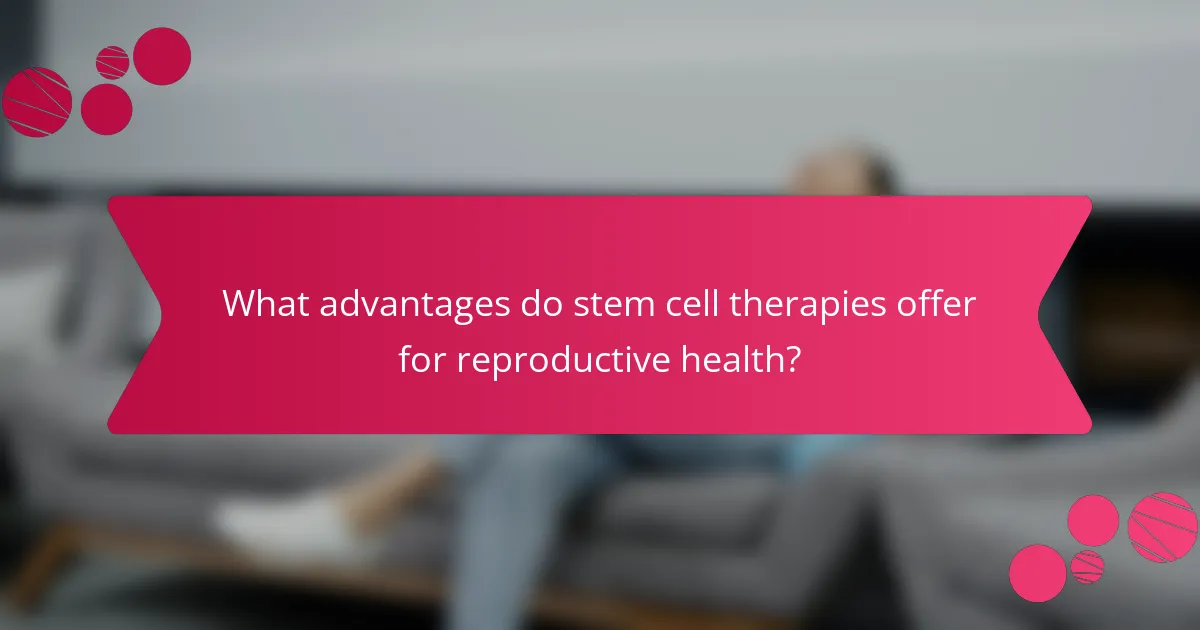
What advantages do stem cell therapies offer for reproductive health?
Stem cell therapies offer significant advantages for reproductive health, including improved fertility, enhanced tissue regeneration, and potential treatment for infertility-related conditions. These therapies can restore ovarian function in women and improve sperm production in men. As a result, they may increase the chances of conception and successful pregnancy. Additionally, stem cell therapies have the potential to address underlying issues such as endometriosis and polycystic ovary syndrome, providing a holistic approach to reproductive health challenges.
How do stem cell therapies improve outcomes for infertility treatments?
Stem cell therapies enhance infertility treatment outcomes by promoting tissue regeneration and improving reproductive function. These therapies utilise stem cells to repair damaged reproductive tissues, potentially increasing success rates in assisted reproductive technologies. Research shows that stem cell applications can lead to improved ovarian response and higher quality embryos, addressing challenges like diminished ovarian reserve. Ethical considerations remain vital, ensuring responsible use and patient consent in these innovative treatments.
What are the potential benefits for genetic disorders and reproductive health?
Stem cell therapies offer significant potential benefits for genetic disorders and reproductive health. They can correct genetic defects, enhance fertility, and improve outcomes for individuals facing reproductive challenges.
One major advantage is the ability to regenerate damaged tissues, which can alleviate conditions such as endometriosis or ovarian insufficiency. Studies indicate that stem cells can differentiate into reproductive cells, potentially restoring fertility in patients with genetic disorders.
Ethical considerations are paramount. The use of stem cells raises questions about sourcing and consent, particularly with embryonic stem cells. However, advancements in induced pluripotent stem cells offer alternatives that may mitigate ethical concerns while still providing therapeutic benefits.
Which patient populations may benefit most from these therapies?
Patients with infertility, autoimmune disorders, or age-related reproductive challenges may benefit most from stem cell therapies. These therapies can potentially restore fertility and improve reproductive health by regenerating damaged tissues. Research indicates that women experiencing premature ovarian failure and men with low sperm counts show promising responses to such treatments. Additionally, patients with conditions like endometriosis could experience relief through stem cell applications.
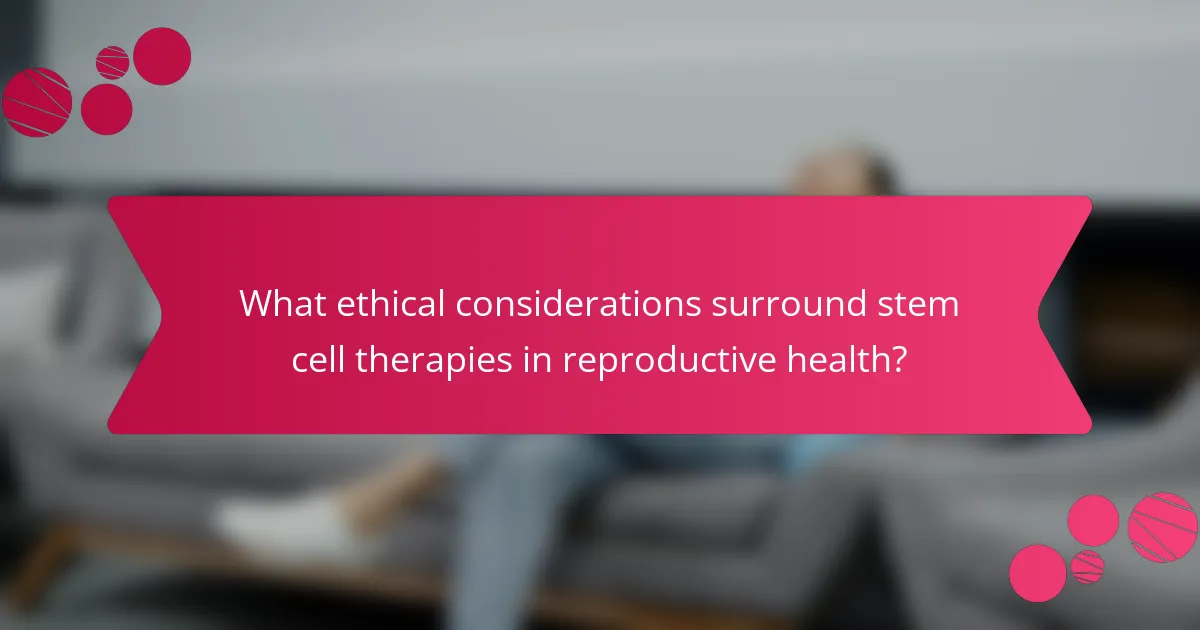
What ethical considerations surround stem cell therapies in reproductive health?
Stem cell therapies in reproductive health raise significant ethical considerations. Key issues include the moral status of embryos, informed consent, and potential exploitation of donors. The debate centres on whether embryos should be viewed as potential life or as research material. Informed consent is crucial, ensuring donors understand risks and implications. Additionally, concerns about equitable access to therapies and the commercialisation of stem cell treatments persist. These factors shape ongoing discussions about the responsible use of stem cell technology in reproductive health.
How do regulations differ across regions regarding stem cell usage?
Regulations regarding stem cell usage vary significantly across regions. In the United States, stem cell therapies are primarily regulated by the FDA, which emphasises safety and efficacy. In contrast, the European Union has stricter guidelines, requiring comprehensive ethical reviews and adherence to the European Medicines Agency’s standards. Countries like Japan have recently relaxed regulations to foster innovation, while others, such as Germany, maintain stringent laws limiting stem cell research. These differences reflect varying cultural attitudes and ethical considerations surrounding reproductive health and stem cell applications.
What are the moral implications of using embryonic versus adult stem cells?
The moral implications of using embryonic versus adult stem cells are significant and complex. Embryonic stem cells offer greater potential for regenerative therapies due to their pluripotency, meaning they can develop into any cell type. However, their use raises ethical concerns regarding the destruction of embryos, which some view as the loss of potential life. In contrast, adult stem cells, derived from tissues like bone marrow, do not involve embryo destruction but have more limited differentiation potential. This distinction highlights the ethical debate between maximising therapeutic potential and respecting the moral status of embryos. As a result, the choice between these two sources involves weighing scientific benefits against ethical considerations.
Which ethical frameworks guide decision-making in stem cell research?
Ethical frameworks guiding decision-making in stem cell research include utilitarianism, deontology, and virtue ethics. Utilitarianism focuses on maximising benefits for the greatest number, while deontology emphasises adherence to moral rules. Virtue ethics centres on the character and intentions of researchers. These frameworks help navigate complex moral dilemmas, balancing scientific advancement with ethical considerations.
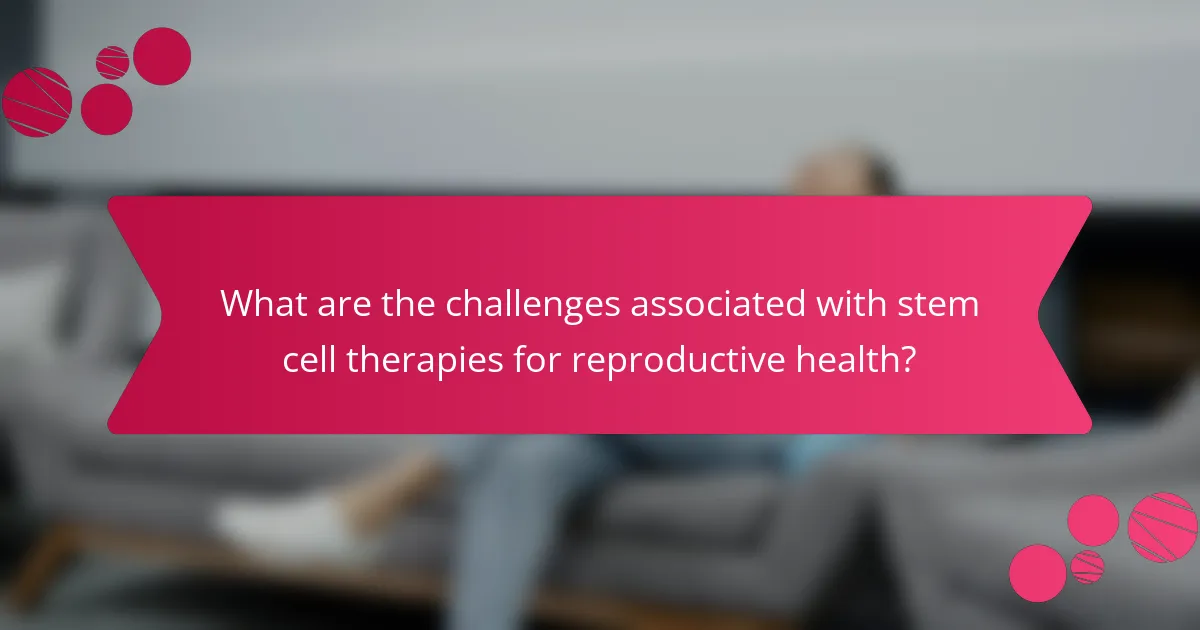
What are the challenges associated with stem cell therapies for reproductive health?
Stem cell therapies for reproductive health face several challenges. These include ethical concerns regarding the source of stem cells, regulatory hurdles, and the risk of tumour formation. Additionally, there is a lack of standardised protocols for treatment, which can lead to inconsistent outcomes. Patient access and the high cost of therapies further complicate their implementation. Finally, the long-term effects and efficacy of these treatments remain under study, presenting a barrier to widespread acceptance.
What are the limitations of current stem cell research in this field?
Current stem cell research in reproductive health faces significant limitations. These include ethical concerns, regulatory hurdles, and technical challenges in safely and effectively applying stem cell therapies. Ethical considerations often complicate the sourcing of stem cells, particularly embryonic ones, leading to public and institutional resistance. Regulatory frameworks vary widely, impacting research funding and approval processes. Additionally, the complexity of reproductive health conditions makes it difficult to develop standardised treatment protocols. These factors hinder the advancement and application of stem cell therapies in this field.
How does patient consent play a role in stem cell therapy?
Patient consent is crucial in stem cell therapy to ensure ethical practices and respect for individual autonomy. Informed consent allows patients to understand the risks, benefits, and alternatives of the treatment. It also fosters trust between patients and healthcare providers. Ethical considerations, including the source of stem cells, further emphasise the need for transparent communication. Ultimately, patient consent safeguards rights while promoting responsible advancements in reproductive health therapies.
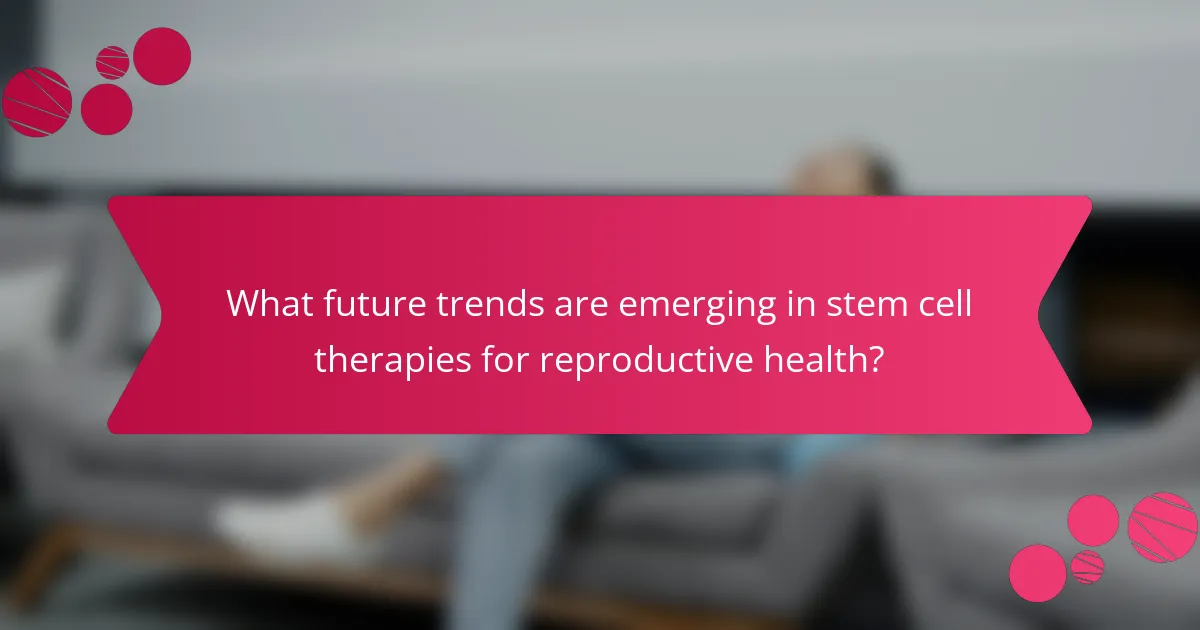
What future trends are emerging in stem cell therapies for reproductive health?
Emerging trends in stem cell therapies for reproductive health focus on personalised treatments and regenerative techniques. Advances in induced pluripotent stem cells (iPSCs) enhance the potential for tailored therapies. Research indicates that these therapies may improve fertility outcomes and address conditions like endometriosis and ovarian aging. Ethical considerations continue to shape the development of these therapies, ensuring responsible application and patient safety.
How might advancements in technology shape the future of these therapies?
Advancements in technology will significantly enhance stem cell therapies for reproductive health. Innovations like gene editing and improved cell culture techniques will increase treatment efficacy and safety. Enhanced imaging technologies will allow for better monitoring of stem cell integration and function. Additionally, artificial intelligence will optimise patient selection and personalised treatment plans. These advancements will ultimately lead to more successful outcomes and broader accessibility of therapies.
What role will personalised medicine play in stem cell therapies?
Personalised medicine will significantly enhance stem cell therapies by tailoring treatments to individual genetic profiles. This approach improves efficacy and reduces adverse effects. Personalised strategies can optimise cell sourcing and application, ensuring better compatibility with patients’ unique biological conditions. As a result, the integration of personalised medicine into stem cell therapies holds promise for advancing reproductive health outcomes.
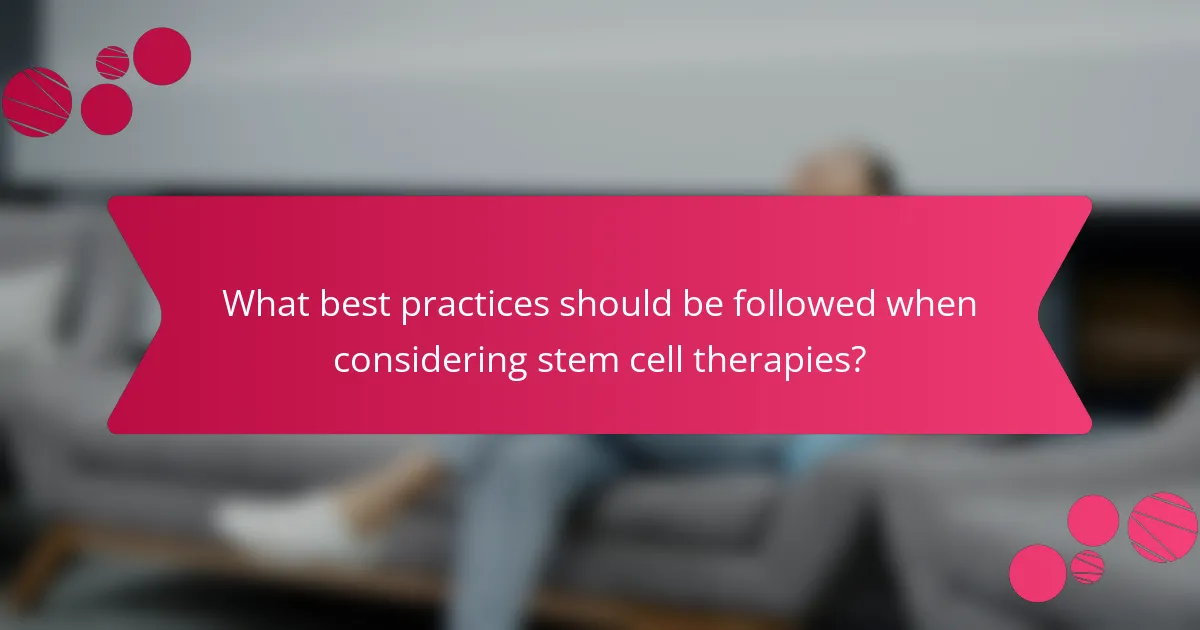
What best practices should be followed when considering stem cell therapies?
When considering stem cell therapies, prioritise safety, efficacy, and ethical standards. First, consult with qualified healthcare professionals to evaluate individual needs. Understand the specific techniques used, such as autologous or allogeneic stem cell sources. Assess the advantages, including potential for improved reproductive outcomes and tissue regeneration. Lastly, consider ethical implications, such as informed consent and the source of stem cells, to ensure responsible treatment decisions.
What common mistakes should patients avoid when exploring treatment options?
Patients should avoid common mistakes like inadequate research, ignoring expert advice, and overlooking potential side effects. These errors can lead to ineffective treatment choices in stem cell therapies for reproductive health.
Many patients fail to ask about the qualifications of practitioners, which is crucial for ensuring safe and effective procedures. Additionally, some individuals may not consider the ethical implications of certain therapies, which can impact their treatment experience and outcomes.
It’s vital for patients to thoroughly evaluate the credibility of sources and seek multiple opinions before making decisions. Understanding the unique attributes of different stem cell techniques can help in making informed choices that align with personal health goals.
How can patients ensure they are receiving ethical and effective care?
Patients can ensure they receive ethical and effective care by researching providers and understanding their rights. Verify the clinic’s accreditation and the qualifications of medical staff. Inquire about the specific techniques used in stem cell therapies, their advantages, and potential risks. Ethical considerations should include informed consent and transparency about treatment outcomes. Engage in discussions with healthcare professionals to clarify any doubts and ensure alignment with personal health goals.
